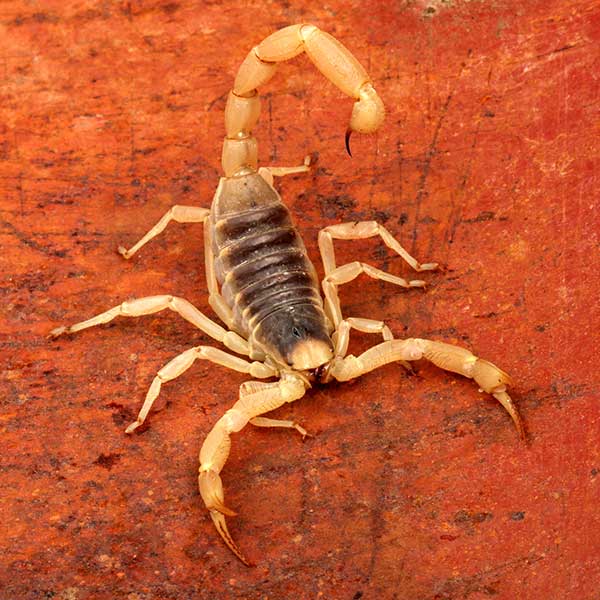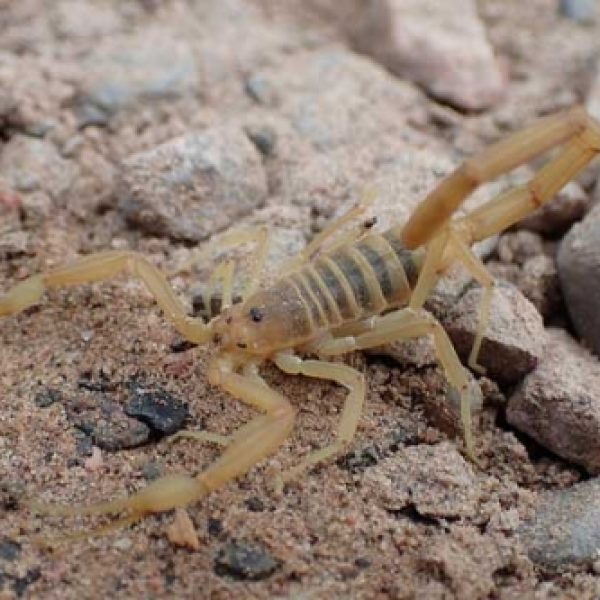A member of the arachnid family, scorpions are feared for their sting. Scorpions don’t have teeth, so they don’t bite, but they do sting. We have several types of scorpions in Nevada, but only two–the bark scorpion and the Arizona hairy scorpion–are capable of inflicting mild to serious damage to humans with their sting. Scorpion stings are painful but rarely life-threatening. Young children, and sometimes much older adults, are most at risk of serious complications.
THE DESERT HAIRY SCORPION STING

Arizona hairy scorpions, also known as desert hairy scorpions, are the largest scorpions in North America, ranging from 5 to 7 inches in length. These scorpions are yellow with brown coloration on the top of its body. They are found throughout the Las Vegas and Henderson valley, preferring to burrow under rocks. These scorpions are aggressive when disturbed, but their sting causes no more than a mild to painful reaction at the site unless the person stung has an allergic reaction to their venom.
THE BARK SCORPION STING

Bark scorpions, also known as Arizona bark scorpions, are typically no more than 3 inches in length with a light brown body and their venom is the most potent scorpion venom in North America. A sting can cause symptoms from severe pain for up to three days, numbness in the affected limb, or convulsions. Death has been reported, though typically only in the elderly, very young, or those with scorpion venom allergies.
SYMPTOMS OF A SCORPION STING
The venom of a scorpion contains a variety of different chemicals, including both neurotoxins and enzymes that penetrate the skin and other tissues.
Most people who are stung by a scorpion will feel a sharp, burning pain not unlike a bee or wasp sting, or will feel like an electric shock. The initial sting can be quite painful, but for most people the discomfort will subside within an hour.
After the sting, there may be burning or numbness at the location of the tail strike. Some people may experience numbness beyond the sting site, seizures, difficulty breathing, blurred vision, or other severe symptoms. If any of these symptoms occur, you should get immediate medical attention as these are symptoms of anaphylactic shock.
SCORPION STING PREVENTION TIPS:
Eliminating food sources and harborage sites around your home is key to preventing a scorpion infestation. Make your home less attractive to scorpions by following these prevention tips:
- Eliminate standing water. Scorpions have a preference and need to settle near water and in moisture laden areas.
- Inspect cabinets, closets, and other dark places on a regular basis
- Clear away brush, debris, and woodpiles from the perimeter of your home. Keep firewood above ground and 30 feet away from your home.
- Repair damaged and torn window screens and seal cracks and crevices in your foundation. Scorpions only need the width of a credit card to gain access.
- Seal entry doors and garage doors. If light can be seen streaming from the exterior, the seal beneath the door should be repaired.
- Eliminate food sources utilizing a professional pest management program. Since scorpions feed on insects, managing pests on your property will help to eliminate their food supply.
WHEN TO SEEK MEDICAL ATTENTION
Get immediate medical care for a child stung by a scorpion.
Call the Nevada Poison Control Center Hotline at 1-800-222-1222 for advice if you’re concerned about a scorpion sting. This service provides a primary resource for poisoning and sting information and can help you to determine when to seek medical attention.
Seek prompt medical care if you’ve been stung by a scorpion and begin to experience widespread symptoms.
IF YOU SEE SCORPIONS IN YOUR HOME
Scorpions have been known to enter homes in order to escape the heat of the desert sun. In order to prevent these occurrences, cracks in walls and foundations should be sealed, ensuring that small scorpions cannot enter. Homes should also be kept clean in order to prevent incidental insects that scorpions may eat, such as ants and cockroaches. Items such as boxes that can serve as hiding places for scorpions should be removed.
If one or two scorpions are seen inside a home in a scorpion-prone area, it may not be a sign of a problem. Individual scorpions can be prevented by ensuring that home entry points are sealed and that items such as clothing are scorpion-free before entering a house. If multiple scorpions are seen in a short period of time it is a likely sign of infestation and a licensed pest-control professional should be called.
